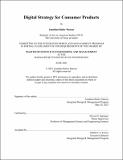Digital Strategy for Consumer Products
Author(s)
Marcus, Jonathan Bailey
DownloadThesis PDF (2.305Mb)
Advisor
Eppinger, Steven D.
Terms of use
Metadata
Show full item recordAbstract
There has been a bifurcation in the consumer goods sector. Many of the most successful players of the past century have used a traditional retail strategy to develop and sell manufactured products. However, in the past decade, the success of digital upstarts has instigated a shift in marketplace dynamics, and the incumbents will need to exercise a digital pivot in order to maintain relevancy and market share.
In this thesis, I analyze the key industry trends driving the digitization of the consumer products industry. Based on this analysis, I then discuss and present strategy recommendations for legacy brands, digital-native brands, and new ventures. I find that many of the fastest-growing players in consumer goods can credit their success to internet-enabled models of management. By building their businesses on a foundation of adaptable, digital capabilities and technologies, these firms have positioned themselves to best serve the growing number of consumers who engage with and purchase products and brands via digital channels.
I conclude by positing that future-oriented and consumer-centric manufacturers and retailers will recognize that consumer culture is increasingly online and in order to capitalize on this new era of value creation, consumer product teams must consider their digital strategy. I speculate that successful firms will employ agile methodologies and a human-centered, data-driven approach within their organization to respond quickly to changing requirements, identify emerging trends, and create value for stakeholders within the changing retail environment.
Date issued
2021-06Department
System Design and Management Program.Publisher
Massachusetts Institute of Technology